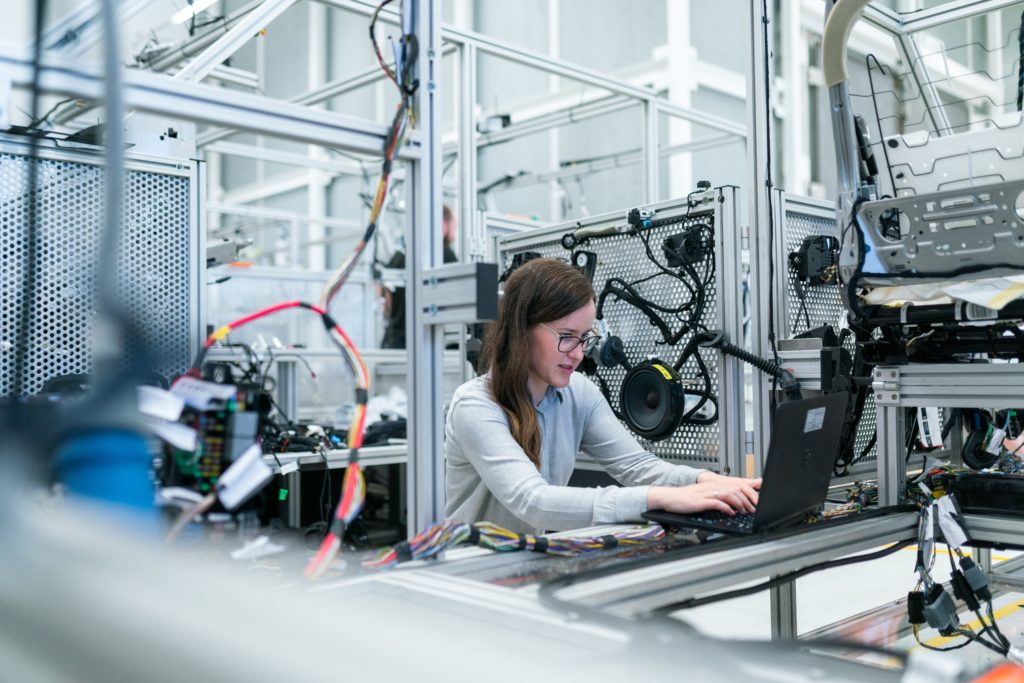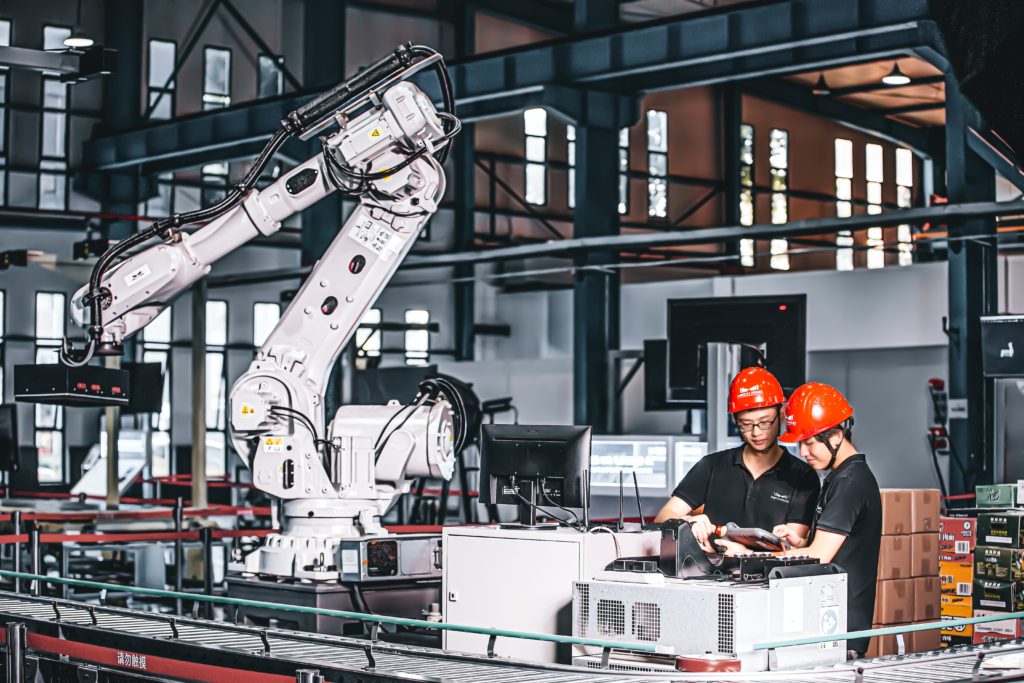
Simon Collinson and Carolin Ioramashvili discuss how University-Industry Collaborations support SME Innovation in the West Midlands and Beyond. This blog post was produced for inclusion in the Birmingham Economic Review for 2022. The annual Birmingham Economic Review is produced by the University of Birmingham’s City-REDI and the Greater Birmingham Chambers of Commerce. It is an in-depth exploration of the economy of England’s second city and a high-quality resource for informing research, policy and investment decisions. This post is featured in Chapter 2 of the Birmingham Economic Review for 2022, on business and disrupted markets. View the Birmingham Economic Review Visit the WMREDI Data Lab to find out more about Birmingham.
The West Midlands has a long and proud manufacturing tradition, partly driven by a wide range of small and medium-sized enterprises (SMEs), from recent start-ups to long-established family firms. Many of these are suppliers to the larger automotive manufacturers, which are concentrated in the region. For these businesses, but also the region as a whole, pursuing innovation to drive competitiveness, grow sales and expand into new markets, is paramount.
SMEs
But the region also has a significant productivity gap in comparison to the UK average and international counterparts. SMEs in the West Midlands with low skills and low levels of capital investment are a major contributor to this gap. They often face hurdles that are harder to overcome than their larger rivals. Maintaining in-house research and development capabilities may not be practical or feasible and management’s time is often focused on running the day-to-day business, rather than understanding and adapting to future market trends and opportunities. These firms are less innovative and less resilient as a result.
Enabling SMEs to improve their productivity and competitiveness has a wider range of potential regional impacts. Improving skills is key to both better firm-level productivity and higher wages for employees. This in turn increases household incomes, and in many cases, this helps reduce the vulnerability of low-wage communities. SMEs become more resilient and less likely to fail (increasing unemployment), and the regional economy as a whole is stronger in the face of economic shocks.

University Partnerships – Part of the Solution
University-based Research and Development (R&D) is at the cutting edge of the technological frontier and the West Midlands has a clear advantage, with excellent science and engineering departments based at the Universities of Birmingham and Warwick, amongst other institutions. But accessing the knowledge and capabilities available within universities is often challenging for SMEs. Lack of time and resources, alongside organisational and cultural differences, make it difficult for the two to come together.
Two organisations located in the West Midlands have a central role to reduce these barriers and make academic research accessible to SMEs and other businesses, improving their ability to innovate. We have conducted case study interviews with representatives from Warwick Manufacturing Group (WMG) and the Manufacturing Technology Centre (MTC) as part of our research into regional innovation ecosystems. Both also act as High Value Manufacturing (HVM) Catapult Centres, funded by Innovate UK.
The Warwick Manufacturing Group (WMG)
WMG was formed in 1980 and is structured as a department at the University of Warwick but is run as a hybrid organisation, with 50% of its staff from academia and 50% from industrial backgrounds. More recently, its manufacturing roots have expanded from the automotive industry to other sectors, including aerospace, energy, pharmaceuticals, cyber security and construction. Alongside its research, WMG also delivers education and training as part of its role within the university. WMG launched two Academies for 14- to 19-year-old students who are exposed to industry from a young age before going on to apprenticeships and degree courses. At the post-secondary level, WMG trains 800 degree apprentices annually who complete an industry-based apprenticeship while studying towards a bachelor’s degree at the same time.

The WMG approach focuses not just on manufacturing, but also on wider business processes, to improve their ability to adopt and exploit new technologies and practices to improve competitiveness. This cross-fertilisation also happens through the co-location of businesses on the Warwick campus, as well as through embedding SMEs within larger research consortia that WMG is involved with. However, challenges remain. An SME that is currently collaborating with WMG appreciates the ability to access talent and some distinctive processes and practices that they were not able to find among private sector consultancies, but laments the bureaucratic hurdles of working within university structures.
The Manufacturing Technology Centre (MTC)
MTC is an independent Research and Technology Organisation founded in 2010 by four institutions – Loughborough University, the Universities of Birmingham and Nottingham, and The Welding Institute (TWI). It was established near WMG in Ansty Park, Coventry, and a further three locations have been added in Liverpool, Oxford, and the London Borough of Havering. Alongside this geographical expansion, its activities have broadened from R&D to encompass training, advanced manufacturing management as well as factory design. MTC operates as a private company limited by guarantee, whose guarantors are its three founding universities. Annual profits of three to six per cent are reinvested into the business.
MTC’s approach is focused on first raising awareness within the SME community of new technologies that may be relevant to them, combined with a diagnostic service to clearly identify the challenges faced by a firm. New processes and technologies are then rolled out, often together with a bespoke training offer, recognising that most smaller businesses do not need to invest in R&D to reinvent the wheel, but can meaningfully drive their productivity and other goals by deploying off-the-shelf technologies that may even be a few years old. The research agenda at the technological frontier pursued by MTC is shaped by its industry members. However, these tend to be larger businesses, as this sort of engagement tends to be less valuable to smaller firms, as described by one long-term collaborator SME of MTC.
Table 1: Case study scale and scope
| Warwick Manufacturing Group (WMG) | Manufacturing Technology Centre (MTC) | |
| Founded | 1980 | 2011 |
| Funding | £60 million p.a. | £83 million p.a. |
| Funding source | 1/3 Catapult centre funding, 1/3 collaborative R&D, 1/3 contract research
|
25% Catapult centre funding, 35% collaborative R&D, 40% industry members
|
| Legal form | University department | Company limited by guarantee, owned by 3 universities |
| Employees | 500 | 800 |
| Locations | Coventry | Coventry, Liverpool, Abingdon (Oxfordshire), Rainham (London) |
Both organisations work with industry to transfer new technologies to their existing processes and work collaboratively to develop new or improve existing processes, products and services. As part of their SME support, funded through the Catapult programme, both organisations offer a diagnostic and consultancy service, whereby a team of academics or engineers visits a firm’s site to inspect their processes and identify some areas of improvement or upgrading. Depending on the businesses’ needs, this may then result in a longer-term collaboration.
As shown in Table 1, MTC has grown to be larger than WMG and slightly more diverse and less connected to the local university base. These differences and others reflect how both organisations have evolved along different pathways to serve distinctive functions as regional innovation accelerators. But they are both significant sources of new and applied knowledge and skills, processes and technologies, to speed up the innovation adoption process in local firms. This is critical in the context of the UK’s levelling up agenda.

Funding
Key funding agencies and government departments, including Department for Business, Energy and Industrial Strategy (BEIS) and UK Research and Innovation (UKRI), are focused on investments to promote innovation to drive local growth in places outside London and the Southeast. Precision interventions are needed, based on strong evidence about how innovation accelerators, alongside other policy interventions, have different impacts on the real economy in different places. The long-term outcomes must include more balanced, inclusive and sustainable growth across UK regions.
WMG and MTC show how a local offering is important in this respect. Significant local barriers to innovation can only be reduced meaningfully and sustainably through long-term, embedded relationships and a deep understanding of businesses’ challenges and how to resolve these with new technologies, expertise and skills. Further research at City-REDI is underway to understand more about the specific local and national impacts of these organisations, in the context of current (or the next wave of) government policies.
This blog was written by Professor Simon Collinson and Dr Carolin Ioramashvili, City-REDI, University of Birmingham.
Disclaimer:
The views expressed in this analysis post are those of the authors and not necessarily those of City-REDI or the University of Birmingham.
